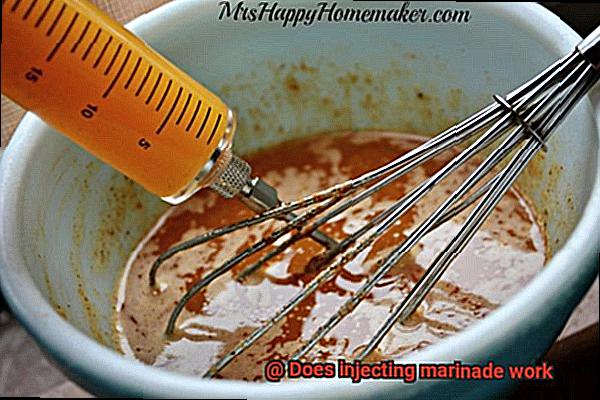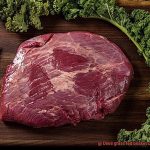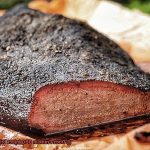Imagine this: you’ve spent hours crafting the perfect marinade, carefully balancing flavors, spices, and aromas. You excitedly soak your meat, letting it marinate overnight, hoping it will soak up every drop of deliciousness. But have you ever wondered if there’s a quicker way to infuse those mouthwatering flavors deep into the meat? Enter the world of marinade injections.
As a culinary fanatic, I’m always on the lookout for innovative ways to take my dishes to new heights. And let me tell you, marinade injections piqued my curiosity like nothing else. After scouring cookbooks and experimenting in my own kitchen lab, I embarked on a personal mission to find out if injecting marinades truly amped up the flavor or if it was just another cooking trend.
Through extensive research, diving into scientific studies, and putting my skills to the test, I can confidently say that injecting marinades is no mere myth – it’s a game-changer that elevates your favorite dishes to flavor heaven.
First things first – let’s get down to the basics of marinade injections. This technique involves using a liquid bursting with flavor – think acids, oils, herbs, spices – and injecting it directly into the meat. While traditional marinating only coats the surface of your protein, injection takes things deeper. It gets inside those layers of goodness and spreads its magic throughout.
Scientifically speaking (bear with me), injecting marinades speeds up flavor diffusion like nobody’s business. When you marinate conventionally, it takes time for those flavors to seep through and make their way inside your meaty masterpiece. But with injection? Boom. Channels are created within the meat that fast-track flavor distribution from top to bottom.
Now here comes the juicy part (pun intended). From personal experience, stamping that marinade’s seal within meat through injections results in taste buds doing the happy dance. Whether it’s juicy poultry, melt-in-your-mouth beef, or flavor-packed pork, my table has witnessed a symphony of satisfied “mmms” from family and friends.
But wait, there’s more. Let’s not forget about the practical perks of this technique. Injecting marinades slashes marinating time like a culinary ninja. It’s the perfect solution for those impromptu gatherings or spontaneous food adventures when you’re short on time. Plus, that concentrated flavor locked inside the meat guarantees an
Contents
The Science Behind Injecting Marinade
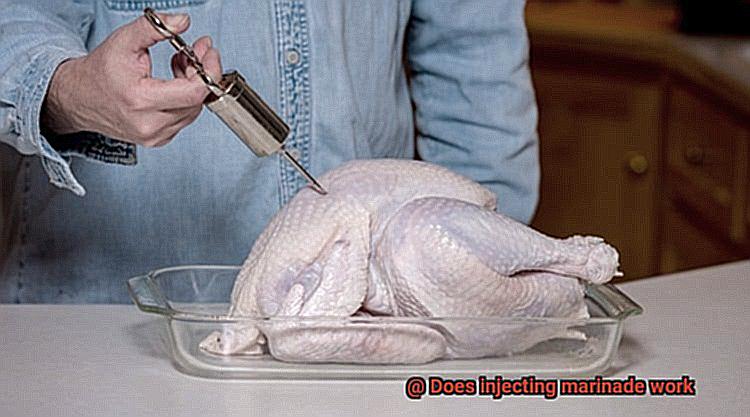
Let’s dive into the details and learn how injecting marinade can take your grilling game to the next level.
The Science of Injecting Marinade:
When you inject marinade into meat, you are essentially infusing it with a flavorful liquid. This process involves using a syringe or injector to penetrate the meat and deliver the marinade directly into the muscle fibers. By doing so, you ensure even distribution of flavors throughout the meat, resulting in a more flavorful end product.
Flavor Enhancement:
Injecting marinade allows the flavors to penetrate deep into the meat, beyond just the surface. This means that every bite will be bursting with deliciousness. The combination of spices, herbs, acids, and oils in the marinade creates a symphony of flavors that harmonize with the natural taste of the meat.
Imagine biting into a juicy steak infused with garlic and herb marinade or savoring a succulent pork shoulder marinated in a tangy barbecue sauce.
Tenderness and Juiciness:
Injecting marinade is particularly beneficial for tougher cuts of meat. The acidic components in the marinade help break down proteins and connective tissues, resulting in a more tender texture. Additionally, injecting marinade helps to retain moisture within the meat, enhancing its juiciness. Imagine sinking your teeth into a perfectly moist and tender piece of brisket that has been injected with a savory marinade.
Maximizing Marinade Penetration:
To achieve optimal results when injecting marinade, it is important to consider a few key factors. Firstly, choose a liquid-based marinade with small particles to prevent clogging the injector needle. Secondly, master the injection technique by evenly distributing the marinade throughout the meat. Practice makes perfect. And finally, let the meat sit for a while after injecting the marinade to allow it to fully penetrate and work its magic.
Types of Marinades:
There are endless possibilities when it comes to marinade flavors. From classic combinations like garlic and herb to bold and spicy options, you can experiment with different marinades to suit your taste preferences.
Just remember to choose a marinade that complements the type of meat you are grilling. Whether you’re grilling chicken, beef, pork, or seafood, there is a marinade out there waiting to elevate your dish to new heights.
Advantages of Injecting Marinade
This method offers several advantages over traditional marinating methods, making it a game-changer for those who want to elevate their grilling game.
First and foremost, injecting marinade allows for deeper penetration into the meat, resulting in more flavorful and tender results. When you simply marinate meat by soaking it in a liquid, the flavors may only reach the surface and not fully infuse into the meat.
However, when you inject marinade directly into the meat, it can reach the inner layers, ensuring that every bite is packed with flavor.
This is especially beneficial for large cuts of meat, such as roasts or whole poultry, where marinating on the surface alone may not be sufficient.
Another advantage of injecting marinade is that it significantly reduces marinating time. While traditional marinating methods require hours or even overnight to achieve desired results, injecting marinade can deliver similar flavors and tenderness in a fraction of the time. This is because the direct injection allows the marinade to quickly permeate the meat, speeding up the marinating process.
Injecting marinade is also more efficient as it ensures that every part of the meat receives an equal amount of flavor. With traditional marinating methods, you may end up with unevenly flavored meat, where some areas are more intensely seasoned than others. However, injecting marinade ensures that the flavors are evenly distributed throughout the meat, providing a consistent taste experience.
Additionally, using an injector allows for more controlled and precise seasoning. You can adjust the amount of marinade injected into different parts of the meat to suit your preference. This level of control is especially beneficial when dealing with lean cuts of meat that tend to dry out easily during cooking. By injecting marinade directly into these cuts, you can add moisture and flavor to keep them juicy and delicious.
Furthermore, injecting marinade can also be a time-saver. Traditional marinating methods often require planning ahead and allowing the meat to sit in the marinade for a long period of time. However, with the injection method, you can quickly and efficiently infuse the meat with flavor just before cooking, saving you precious time without compromising taste.
Factors to Consider When Using This Technique
When using the marinade injection technique, there are several factors to consider that can greatly impact the outcome of your grilled meats.
These factors include the type of meat, the marinade ingredients, the injection method, timing, cooking method, and safety precautions.
Firstly, the type of meat you choose is crucial. Different cuts of meat have varying levels of tenderness and porousness, which can affect how well they absorb the flavors. Poultry like chicken and turkey are excellent candidates for marinade injections as they readily soak up the flavors and moisture.
However, tougher cuts of beef or pork may require longer marinating times or other tenderizing techniques in addition to injections.
Secondly, the marinade itself plays a vital role in enhancing both the flavor and tenderness of your meat. Choosing the right ingredients is key. Acidic components like citrus juices or vinegar can help break down muscle fibers and make the meat more tender.
Additionally, herbs, spices, and oils can add depth and complexity to the flavor profile. So be sure to choose your marinade ingredients wisely.
Next, let’s talk about the injection method. There are various tools available for injecting marinades, including syringes or injectors with multiple needles. The key is to ensure even distribution of the marinade throughout the meat.
Injecting too close to the surface may result in uneven flavor distribution, while injecting too deep could cause the marinade to leak out. So take your time and find a method that works best for you.
Timing is also crucial when it comes to injecting marinades. Some experts recommend injecting a few hours before cooking, while others suggest doing it a day in advance to allow for better absorption of flavors. It’s essential to balance the desired level of flavor infusion with the time available for marinating.
The cooking method you choose can also impact the effectiveness of marinade injections. Grilling allows for direct heat exposure and can help caramelize the flavors from the marinade on the surface of the meat.
On the other hand, slow cooking methods like smoking or braising may result in deeper flavor penetration as the meat has more time to absorb the marinade. So consider your cooking method carefully to achieve your desired outcome.
Lastly, let’s not forget about safety precautions. When using marinade injections, it’s crucial to follow proper food safety guidelines. Ensure that the marinade is properly prepared and stored, and avoid reusing any leftover marinade that has come into contact with raw meat. Additionally, thoroughly clean and sanitize any utensils or equipment used for injecting marinades to prevent cross-contamination.
Choosing the Right Type of Marinade for Injection
Choosing the Right Type of Marinade for Injection Grilling
Grilling is an art form, and injecting marinade into your meat can take your grilling game to the next level. But with so many options available, how do you choose the right type of marinade for injection? Here are some key factors to consider when selecting the appropriate marinade for injection grilling.
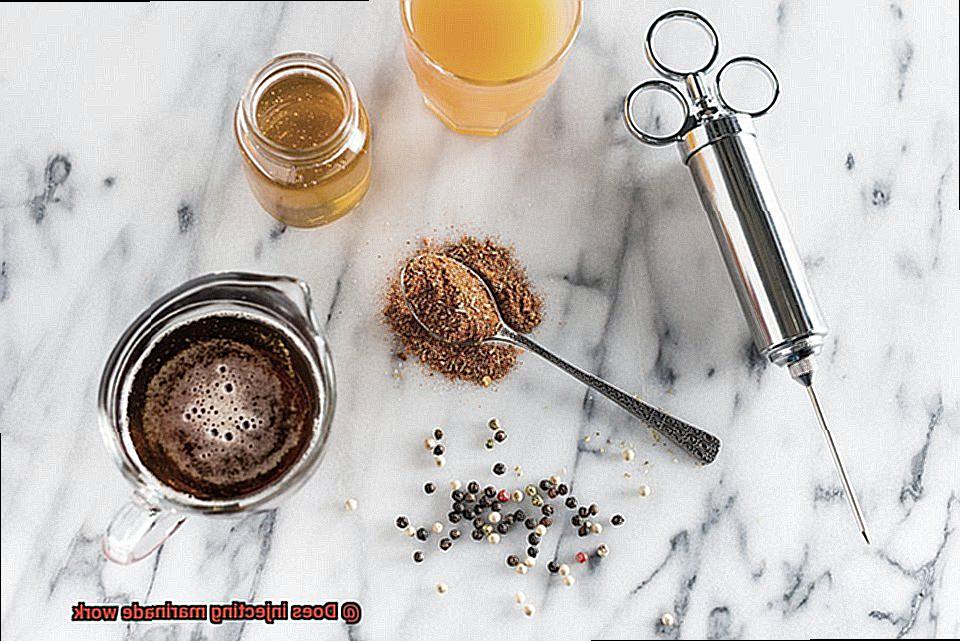
- Flavors: The first thing to consider is the flavors you want to infuse into your meat. Different types of marinades offer different flavors, so it’s essential to choose one that complements the type of meat you are cooking.
- Citrus-Based Marinades: Citrus fruits like oranges, lemons, and limes add a tangy and refreshing flavor to the meat. This type of marinade works well with poultry, pork, and seafood dishes.
- Savory Marinades: A savory marinade with soy sauce, Worcestershire sauce, garlic, and herbs adds depth and richness to the meat. It is great for beef and lamb dishes.
- Sweet or Spicy Marinades: If you prefer a sweeter flavor profile, opt for a teriyaki or barbecue marinade. These marinades typically contain brown sugar or honey, giving the meat a sweet and caramelized taste. They work well with chicken, beef, and pork. On the other hand, if you’re looking for a spicy kick, a hot sauce-based marinade may be the way to go. These marinades add heat and complexity to the meat and are perfect for those who enjoy spicy flavors.
- Thickness: Consider the thickness of the marinade when choosing one for injection. A thinner marinade will be easier to inject into the meat and will distribute more evenly. However, a thicker marinade may provide a more concentrated flavor but may require more effort to inject.
- Dietary Restrictions: It’s important to take into account any dietary restrictions or preferences when choosing a marinade. There are many marinades available that are gluten-free, dairy-free, or suitable for vegetarians and vegans. Consider any allergies or sensitivities that you or your guests may have and choose a marinade that accommodates those needs.
Mastering the Technique for Optimal Results
Grilling is an art form that allows us to unleash our culinary creativity and tantalize our taste buds. One technique that has gained popularity among grill enthusiasts is injecting marinade into meat. But how can we master this technique for optimal results? In this blog post, we will explore the step-by-step process of injecting marinade, from choosing the right tools to achieving a mouthwatering masterpiece on your grill.
Choosing the Right Tool:
To achieve optimal results when injecting marinade, it is essential to start by selecting the right tool. Look for a meat injector, also known as a flavor injector, with a syringe-like design and multiple needles of varying sizes. This selection will allow you to control the flow and distribution of the marinade, ensuring an even flavor infusion throughout the meat.
Preparing the Meat:
Properly preparing the meat is crucial before injecting the marinade. Trim off any excess fat or connective tissue that could hinder the injection process. Creating small pockets or slits in the meat will also help ensure that the marinade reaches every part, resulting in a more evenly flavored dish that will leave your guests in awe.
Crafting the Perfect Marinade:
The success of injecting marinade relies heavily on choosing or crafting a marinade recipe that complements the type of meat you are working with and suits your taste preferences. Whether it’s a tangy citrus-based marinade or a savory blend of herbs and spices, allow the flavors to meld together by preparing the marinade in advance.
Injection Technique:
Now comes the exciting part – injecting the marinade. Fill your injector with the marinade, being careful not to overfill it to avoid leaks during injection. Insert the needle into various parts of the meat, strategically distributing the marinade evenly throughout. Take your time and inject slowly, allowing the marinade to penetrate deep into the muscle fibers for maximum flavor infusion.
Resting Time:
After injecting the marinade, give the meat some resting time before cooking. This step is crucial as it allows the flavors to permeate the meat, resulting in a more flavorful end product. Aim for a resting time of at least 30 minutes to an hour, depending on the type of meat and marinade used. Patience is key here – trust the process and let those flavors work their magic.
Proper Grilling Techniques:
Now that the marinade has worked its wonders, it’s time to fire up the grill. Ensure that your grill is preheated to the appropriate temperature and monitor the cooking process closely. Keep in mind that the injected marinade may have already tenderized the meat to some extent.
Avoid overcooking, which can lead to dry and tough meat, or undercooking, which can pose food safety risks. Strike the perfect balance and savor the juicy, succulent results.
Not Suitable for All Types of Meat
Injecting marinade into your meats can be a game-changer, but before you start injecting away, it’s crucial to understand that this technique may not be suitable for all types of meat. In this article, we will explore the factors that determine whether injecting marinade is a sizzling success or a flavor flop.
The Tale of Tender Cuts:
Imagine a succulent ribeye sizzling on the grill, already bursting with natural tenderness and flavor. Injecting marinade into such cuts may be unnecessary because they are already tender and flavorful on their own. Tender cuts like tenderloin or ribeye speak for themselves and don’t require any extra boost.
Delicate Delights:
Not all meats are created equal in terms of thickness and texture. Thin or delicate meats like fish or thin cuts of pork might not be able to handle the pressure of injection without falling apart. We don’t want your beautiful fillets turning into a fishy mess, do we?
The Brining Brigade:
Some meats, such as poultry or pork, benefit more from a brining process than injecting marinade. Brining involves soaking the meat in a saltwater solution to enhance moisture and flavor. This method works wonders for these types of meats and ensures they remain juicy and delicious.
Tackling Tough Cuts:
Now let’s talk about those tough cuts of meat that require some extra TLC. Injecting marinade into tough cuts like brisket or shoulder can work wonders by tenderizing and infusing flavors deep into the muscle fibers. It’s like giving your meat a flavorful massage.
Cooking Method Matters:
Grill masters, listen up. The cooking method plays a crucial role in deciding whether to inject marinade. If you’re planning to slow cook or smoke the meat for an extended period, injecting marinade can help keep it moist and infuse flavors throughout. However, if you’re grilling or searing at high heat for a short time, injecting marinade may not have enough time to penetrate and make a significant difference in flavor.
In conclusion, the decision to inject marinade into your meats depends on various factors such as texture, thickness, and cooking method. Tender cuts may not need the extra boost, while delicate meats could crumble under the pressure. Brining works wonders for poultry and pork, while tough cuts benefit from injection magic. Remember to consider the cooking method too.
0n3MR6TxaAc” >
Conclusion
In conclusion, the process of injecting marinade into meat has been proven to be an effective and efficient method for enhancing flavor. By using a marinade injector, you can infuse your meat with delicious flavors, ensuring that every bite is bursting with taste. This technique allows the marinade to penetrate deep into the muscle fibers, resulting in a more flavorful and tender end product.
Injecting marinade works by creating pockets of flavor within the meat, allowing it to marinate from the inside out. This method is particularly beneficial for larger cuts of meat, such as roasts or whole poultry, where surface marination may not be sufficient. The injection process ensures that the flavors are evenly distributed throughout the meat, leaving no bland or dry spots.
Not only does injecting marinade enhance the taste of your dish, but it also helps to keep your meat moist and juicy during cooking. The added moisture from the marinade helps to prevent drying out, resulting in a succulent and flavorful final product.
Furthermore, injecting marinade offers a time-saving advantage. Unlike traditional marinating methods that require hours or even overnight soaking, injecting allows you to achieve maximum flavor in a fraction of the time. With just a few minutes of injection time, you can achieve results comparable to hours of traditional marinating.
So next time you’re preparing a meal and want to take it up a notch in terms of flavor and tenderness, don’t hesitate to give injecting marinade a try.

